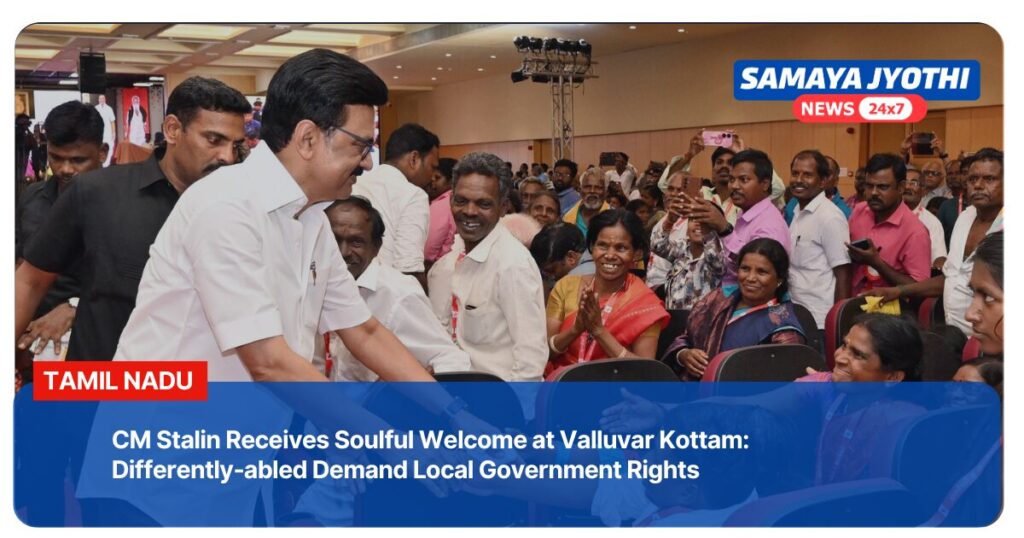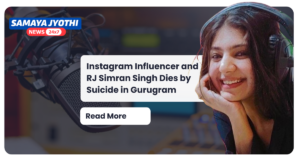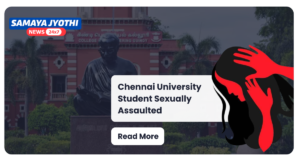- Home
- Latest News, India
- Rights for Differently‑abled in Local Government: Warm Reception for CM Stalin
Rights for Differently‑abled in Local Government: Warm Reception for CM Stalin
Rights for Differently‑abled in Local Government received a compelling boost today as Tamil Nadu Chief Minister M.K. Stalin was given a heartfelt welcome by hundreds of differently‑abled individuals and members of the public at Valluvar Kottam, Chennai. The gathering was organized by the Coordination Committee of the Differently‑abled (CCD-A), a coalition advocating for enhancing social justice and guaranteeing the right of people with disabilities to participate in local government responsibilities. The event served as both a festive reception and an urgent platform for articulating policy demands aimed at achieving equity in governance.
Rights for Differently‑abled in Local Government – Context and Significance
The demand for inclusive governance is not new, but it has gained renewed momentum in recent years. Activists and advocates emphasize that inclusion must move beyond rhetoric to practical implementation at the grassroots political level. While national and state legislations like the Rights of Persons with Disabilities Act, 2016, have created a formal framework, many differently‑abled individuals still face barriers to accessing public office, contesting local elections, or even participating in civic decision-making processes.
The function held at Valluvar Kottam illuminated both the urgent need and public will to bridge this gap. The CCD-A has been campaigning tirelessly for constitutional amendments and policy clarity that mandate representation of persons with disabilities in municipal and panchayat bodies, either through reserved seats or quota systems.
The Event – Opening Ceremony and Warm Welcome
At approximately 10:30 AM, amidst the serene grounds of Valluvar Kottam, members of the CCD-A organized a ceremonial procession. Participants included wheelchair users, visually impaired citizens, those with hearing limitations, intellectual disabilities, and chronic health conditions. Each group presented cultural performances—songs, dances, poetry recitals—that reflected the inner strength and aspirations of differently‑abled communities.
CM M.K. Stalin arrived shortly afterward, welcomed by a vibrant guard of honor. Supporters lined the pathway holding banners such as “Inclusion Now,” “Seats for All,” and “Voices of Change.” Their chants of “Rights, Rights, Rights!” echoing off the marble halls reinforced the spirit of the umbrella slogan: Rights for Differently‑abled in Local Government.
In his opening remarks, CCD-A President Ms. Kavitha Kumar explained:
“Our demand is simple: fair representation. If the city council makes decisions that affect our lives, we must have a seat at the table.”
CM Stalin’s Address – Promise and Policy
CM Stalin, visibly moved by the reception, responded with gratitude and affirmations:
“Today, you have spoken for yourselves and millions across Tamil Nadu. Your voices are strong and your presence powerful. The government hears you—and we will act.”
He committed to:
-
Introducing constitutional amendments to reserve seats in municipal and panchayat bodies for persons with disabilities.
-
Establishing a task force to draft inclusive elections protocols, including physical access, assistive technologies, and voter facilitation services.
-
Launching training scholarships so differently‑abled individuals can run for office and lead community advisory committees.
He emphasized, “Representation isn’t charity. It is a fundamental democratic right,” reinforcing the event’s primary message: Rights for Differently‑abled in Local Government.
Policy Experts Weigh In
Dr. Anita Raghavan, a disability rights expert, applauded the event:
“This level of public engagement is critical. Momentum builds not only through laws—but through voices, actions, and visibility.”
She explained that while reservation for women and marginalized communities exists, persons with disabilities often fall outside mainstream affirmative action without dedicated mechanisms.
Advocate Sanjay Rao, representing the NGO Access for All, added:
“A reserved seat in local government ensures accountability. If a councillor lives with a disability, they are better positioned to amplify community needs.”
Five Inspiring Milestones Revealed at the Gathering
The event spotlighted five key milestones and upcoming steps in the campaign:
-
Policy Roadmap Launch: CCD‑A released a charter outlining legislative steps for implementing disability-reserved seats by 2026.
-
Training Centre Announcement: Tamil Nadu Government will partner with NGOs to establish leadership training centres in every district.
-
Electoral Accessibility Pilot: Model polling booths with tactile ballots, ramped entrances, and Braille signage will be tested in local elections.
-
Community Councils: A plan to constitute advisory councils at urban ward level, including at least one elected official with a disability.
-
Annual Audit and Inclusion Report: The state will publish an annual report on representation, policy impact, and emerging gaps.
These align closely with the thrust behind Rights for Differently‑abled in Local Government, highlighting a path from awareness to structured policy.
Stories from the Ground
Several attendees shared personal experiences:
-
Ms. Lakshmi (wheelchair user), said: “I have petitioned local offices many times, only to find inaccessible entryways. Soon, I hope I can stand for council—my wheelchair won’t hold me back.”
-
Mr. Rajesh (visually impaired teacher), shared: “My students ask why they don’t see leaders like themselves. Representation matters—and this event and policy roadmap show they can achieve it.”
-
Ms. Tara (hearing impaired community worker), added: “Local councils decision impact where we live—waste management, pedestrian safety, schools. We need a voice there.”
Their stories underscored a central message: Rights for Differently‑abled in Local Government must translate into everyday equity.
The Path Forward – From Pledge to Progress
The event’s energy was matched by strategy:
-
Legal Task Force: Lawyers, policy specialists, and activists will collaborate to prepare amendment drafts.
-
Pilot Implementation: Ramping up accessibility effort at selected polling booths ahead of next municipal elections.
-
Public Outreach Campaign: Mass media messaging—prints, TV, digital—to build awareness and push voter engagement.
-
Monitoring Cell: A civilian committee will monitor election conduct, access barriers, and seat reservation impact.
-
Evaluation Metrics: A framework with participation rates, candidate diversity, and policy outcomes to gauge effectiveness.
These ensure that Rights for Differently‑abled in Local Government emerges as a sustained movement—not a one-off event.
Community and Public Support
Local civic groups and NGOs were present to lend their voices:
-
Save Chennai Campaign pledged assistance in mapping inaccessible zones.
-
Women with Disabilities Collective will ensure gender aspects are amplified in policy.
-
Youth for Inclusion, a college volunteer group, promised election day assistance and peer support for visiting the polls.
Their messages emphasized that Rights for Differently‑abled in Local Government reflects a broader societal responsibility.
Challenges and Expert Advice
Transition will not be seamless. Challenges will include:
-
Resistance to Reserved Seats: Some existing politicians fear competition. Advocates urge calm dialogue and public education.
-
Infrastructure Gaps: Fully accessible public spaces require investment and careful planning.
-
Awareness Barriers: Many voters and officials remain unaware of disability rights provisions.
Expert recommendations include:
-
Phased rollouts with pilot projects.
-
Cross-party consensus building.
-
Annual audits and community feedback.
-
Dedicated funding for accessibility upgrades.
Voices for Vigilance
Dr. Meera Krishnan, policy analyst, warned:
“If reserved seats aren’t backed by infrastructure, the candidates can’t participate meaningfully. We need dual focus: representation and readiness.”
Similarly, municipal engineer Santhosh Reddy emphasized:
“Civic centers, offices, polling stations—all require universal design. We must build with intention.”
Rights for Differently‑abled in Local Government – What It Means for Tamil Nadu
If implemented effectively, Tamil Nadu could:
-
Become the first Indian state to reserve local govt seats for persons with disabilities.
-
Serve as a national model under the RPwD Act.
-
Elevate civic planning to universal design standards.
-
Enable direct inclusion of disability-related policy at grassroots levels.
This initiative could reshape empowerment within democracy.
International Comparisons & Best Practices
The event’s momentum aligns with global precedents:
-
Nepal Reserve Quota: Nepal reserves 5% of local election seats for persons with disabilities, resulting in increased civic participation.
-
UK Council Accessibility: British councils ensure accessible voting via mail ballots, ramps, and tactile signage.
-
US ADA Compliance: American polling places integrate curb ramps, assistive voting devices, and interpreter services—models for Tamil Nadu’s efforts.
These show that structural inclusion paired with Rights for Differently‑abled in Local Government is both achievable and replicable.
Five Inspiring Milestones – Recap and Impact
-
Charter launch – A clear roadmap toward reserved representation.
-
Training centers – Building capacity among candidates.
-
Pilot polling booths – Practical accessibility solutions in action.
-
Community councils – Local advisory bodies with representation.
-
Annual report – Ongoing transparency and accountability.
These are the 5 Inspiring Milestones Today framing Rights for Differently‑abled in Local Government as a living, evolving initiative.
Government Assurances and Next Steps
CM Stalin reaffirmed:
-
Cabinet approval soon for the task force and pilot infrastructure funds.
-
Disability budget head to oversee implementation.
-
Local Authorities circular to begin accessibility upgrades within three months.
-
Annual public forum on representation, starting with Chennai and Coimbatore.
-
State inclusive governance portal to track progress and allow citizen feedback.
These concrete promises move the movement from aspiration to administration.
Expert and Civil Society Backing
Organizations like Access for All, Rights Now, and the Chennai Disability Alliance commit to:
-
Monitoring elections.
-
Reporting roadblocks.
-
Hosting candidate training workshops.
-
Running accessibility audits.
Their unified call: ensure Rights for Differently‑abled in Local Government becomes practice, not just policy.
Public Reaction and Media Coverage
Mainstream and digital media outlets carried the message widely:
-
TV channels featured event highlights and interviews.
-
Newspapers carried bold headlines of CM support.
-
Social media amplified personal stories using hashtags: #InclusionInPower #AccessibleChennai #DisabilityRightsTN.
Public comments underscored emotional impact:
“I never thought I’d see a politician promise seats for my community. Today is historic.”
Measuring Success: Metrics Ahead
President Kavitha Kumar outlined success indicators:
-
Number of reserved seats in next elections.
-
Candidate diversity and electoral win rates.
-
Accessibility ratings of polling stations.
-
Voter turnout among differently‑abled people.
-
Satisfaction surveys from community polls.
These quantify the outcomes of Rights for Differently‑abled in Local Government.
Voices for the Long Term
Mr. Rajesh (visually impaired teacher) stated:
“Once we elect leaders like us, school zones, street crossings, and health centers change for the better. Inclusion reverberates.”
Ms. Lakshmi (wheelchair user) added:
“I want my child to grow up seeing public leaders who face the same struggles. That normalizes equality.”
A Turning Point for Inclusive Democracy
The Valluvar Kottam gathering marks an emotional and political turning point. With civil society voices amplified, government commitment expressed, and a clear policy roadmap unveiled, the cause for Rights for Differently‑abled in Local Government is poised to transition from promise to policy.
Five inspirational milestones were announced. Strategic steps initiated. Community energy harnessed. All under the symbol of inclusive democracy.
As Tamil Nadu charts this bold course, the event builds collective resolve: that democracy thrives when every voice—regardless of ability—sits at the decision-making table. This day may well be remembered as the dawn of truly accessible governance in India.
Click for more latest news. Also get top headlines and latest news from India and around the world at samaya jyothi







